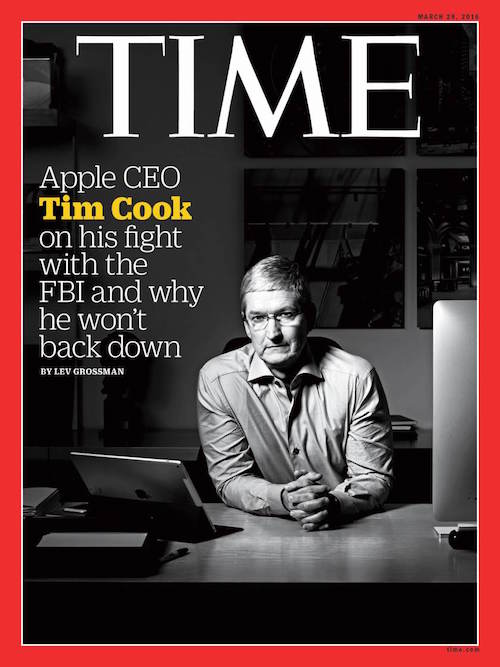Apple CEO Tim Cook will be featured on the cover of the March 28th edition of TIME Magazine in relation to the ongoing Apple-FBI debate over unlocking an iPhone belonging to deceased San Bernardino shooter Syed Farook.
The print edition includes a lengthy interview with Cook, who talked mostly about widely known background details pertaining to the case, just days before Apple and the FBI are set to appear in a U.S. court on Tuesday, March 22.

Cook insists that Apple’s refusal to create a modified, less-secure version of iOS, enabling the FBI to unlock Farook’s passcode-protected iPhone using brute force, was a “labored decision” based on lengthy internal discussions.
“We had long discussions about that internally, when they asked us,” Cook says. “Lots of people were involved. It wasn’t just me sitting in a room somewhere deciding that way, it was a labored decision. We thought about all the things you would think we would think about.”
Cook said that he found out about the FBI-backed court order demanding Apple help federal investigators access data on the shooter’s iPhone through the press, and he admitted to being “deeply offended” by the government agency “talking about or lying about [Apple’s] intentions.”
“Do I like their tactics?” Cook says. “No, I don’t. I’m seeing the government apparatus in a way I’ve never seen it before. Do I like finding out from the press about it? No, I don’t think it’s professional. Do I like them talking about or lying about our intentions? No. I’m offended by it. Deeply offended by it.”
Cook likened Apple’s stance to “freedom of speech” in the U.S., which is protected under the First Amendment of the Constitution.
“When I think of civil liberties, I think of the founding principles of this country,” Cook says. “The freedoms that are in the First Amendment, but also the fundamental right to privacy. And the way that we simply see this is, if this All Writs Act can be used to force us to do something that would make millions of people vulnerable, then you can begin to ask yourself, If that can happen, what else can happen? In the next Senate you might say, Well, maybe it should be a surveillance OS. Maybe law enforcement would like the ability to turn on the camera on your Mac.” […]
Except that it protects terrorists as well as good guys. “We get that,” Cook says. “But you don’t take away the good for that sliver of bad. We’ve never been about that as a country. We make that decision every day, right? There are some times that freedom of speech, we might cringe a little when we hear that person saying this and wish they wouldn’t. This, to us, is like that. It’s at the core of who we are as a country.”
While the FBI has argued that it only wants access to a single iPhone, Cook stressed that “it’s not about one phone” and that weakening encryption could set a dangerous legal precedent — which the FBI itself has partially acknowledged.
“It’s very much about the future. You have a guy in Manhattan saying, I’ve got 175 phones that I want to take through this process.” (The guy in question being New York County district attorney Cyrus Vance, who did in fact say that.)
The full-length interview can be read on TIME‘s website and in the March 28 print issue.
Note: Due to the political nature of the discussion regarding this topic, the discussion thread is located in our Politics, Religion, Social Issues forum. All forum members and site visitors are welcome to read and follow the thread, but posting is limited to forum members with at least 100 posts.
Discuss this article in our forums
Source: MAC ROUMORS
